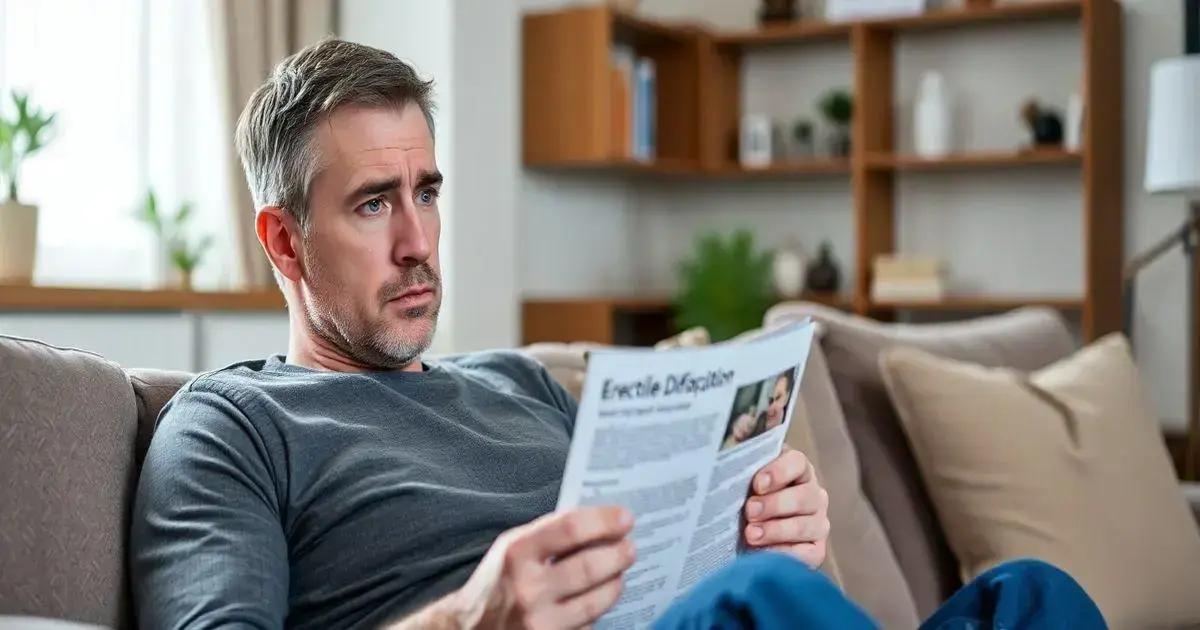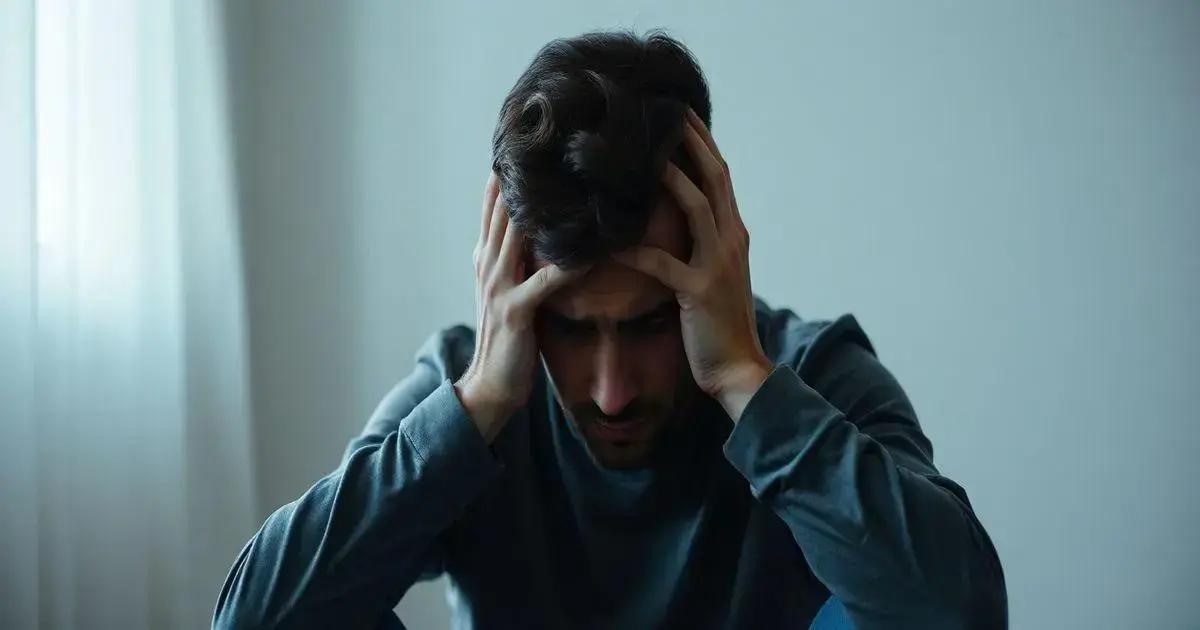The connection between erectile dysfunction and depression is significant, as both conditions can affect each other. ED can lead to feelings of inadequacy and anxiety, contributing to depression, while depression can decrease libido and worsen ED. Seeking treatment through professional help, medication, and lifestyle changes, as well as breaking the stigma surrounding these issues, is crucial for improving overall mental and sexual health.
The connection between erectile dysfunction and depression is often underestimated. Many men silently struggle with both issues, leading to a significant impact on their overall well-being. This article will delve into how these conditions are intertwined, discussing the psychological effects of erectile dysfunction, and the importance of seeking help. Understanding this connection is crucial for fostering better mental and physical health.
Understanding Erectile Dysfunction

Erectile dysfunction (ED) is a condition where a man finds it difficult to achieve or maintain an erection during sexual activity. It’s more common than many people realize and can occur at any age. However, it becomes more prevalent as men get older.
There are various factors that contribute to erectile dysfunction. Physical causes include health issues such as heart disease, diabetes, obesity, high blood pressure, and hormonal imbalances. Psychological factors like stress, anxiety, and depression can also play a significant role in ED. When a man is worried about his sexual performance, it can create a cycle of anxiety that worsens the situation.
Common Symptoms of ED
Men experiencing erectile dysfunction may notice difficulty in achieving erections, reduced sexual desire, or problems with ejaculation. These symptoms can vary from occasional difficulties to a complete inability to perform sexually.
Diagnosis of ED
Diagnosing erectile dysfunction typically involves a visit to a healthcare provider. The doctor will ask about symptoms, medical history, and can perform physical examinations, lab tests, or psychological assessments to determine the underlying causes of ED.
Impact on Quality of Life
Erectile dysfunction can significantly affect a man’s quality of life. It may lead to low self-esteem, relationship problems, and can even contribute to feelings of depression. Understanding this condition and its effects is essential to address both the physical and emotional aspects of sexual health.
How Depression Impacts Libido

Depression can have a profound impact on a person’s libido, which refers to sexual desire. For many individuals, when they are feeling depressed, their interest in sex can decrease significantly. This reduction in libido often happens because depression affects the brain’s chemistry and hormone levels that are crucial for maintaining sexual desire.
One reason depression lowers libido is due to the emotional fatigue it brings. Individuals suffering from depression may feel excessively tired, hopeless, or detached. These feelings can diminish sexual interest and motivation, making intimacy seem unappealing.
Biological Factors
Depression can disrupt the hormones that govern sexual function. Low testosterone levels in men, commonly linked with depression, can lead to decreased sexual drive. Similarly, women may experience hormonal changes that affect their sexual health due to the emotional stress of depression.
The Cycle of Depression and Low Libido
There is often a cycle between depression and low libido. When a person experiences a decline in sexual desire, it can lead to feelings of inadequacy, which can intensify depressive symptoms. This negative feedback loop can further weaken their interest in sexual activity.
Impact on Relationships
Low libido due to depression can affect intimate relationships. Partners may feel confused or rejected when their loved one is disinterested in sex. This feeling can lead to misunderstandings, miscommunication, and resentment, ultimately straining the relationship.
Recognizing the Signs
It is essential to recognize when depression is impacting libido. Signs may include a notable lack of interest in sexual activities, difficulty in achieving arousal, or a general sense of disconnection from one’s partner. Acknowledging these signs can be the first step towards seeking help.
The Psychological Effects of ED

Erectile dysfunction (ED) is not just a physical issue; it can have significant psychological effects as well. Men dealing with ED often experience feelings of frustration, inadequacy, and embarrassment. These emotions can lead to decreased self-esteem, which can further exacerbate sexual performance issues.
Many men begin to feel anxiety about their sexual abilities after experiencing episodes of ED. This anxiety can result in a vicious cycle where the fear of not being able to perform well in bed leads to increased performance anxiety, making it even harder to achieve an erection.
Impact on Mental Health
ED can contribute to the development of mental health issues such as depression and social withdrawal. When one’s sexual health is compromised, it can greatly affect their overall mood. The emotional burden of ED may lead to feelings of isolation, causing men to avoid social situations or intimate relationships.
Relationship Strain
Relationships can also suffer due to the psychological effects of ED. Partners may take the dysfunction personally, misinterpreting it as a lack of attraction or love. Conversations about sexual health often become fraught with misunderstandings and resentment, further straining the relationship.
Accepting Help
Acceptance is a crucial step for men experiencing ED. Acknowledging that one needs help can lead to healthier coping mechanisms. Professional therapy can provide valuable support, helping individuals address the psychological aspects of ED, improve self-esteem, and start open discussions with their partner.
Treatment Options for ED and Depression

Treating erectile dysfunction (ED) and depression often requires a multi-faceted approach. Understanding this connection is important for finding effective treatment. Here are some common options.
Medications
Oral medications are one of the first treatment options for ED. These medications, known as PDE5 inhibitors, relax the blood vessels and increase blood flow to the penis. Common examples include Sildenafil (Viagra), Tadalafil (Cialis), and Vardenafil (Levitra). These can effectively help with erections, but it’s important to consult a doctor to find the right option.
Counseling
Psychotherapy or counseling can be helpful for both ED and depression. Talking to a mental health professional can help address the emotional factors that contribute to these conditions. Cognitive-behavioral therapy (CBT) is often effective in treating performance anxiety, depression, and relationship issues.
Lifestyle Changes
Making healthy lifestyle changes can also aid in treating ED and depression. Regular exercise, a balanced diet, and reducing alcohol intake can improve both physical and mental health. Even simple activities like walking or cycling can enhance mood and increase libido.
Support Groups
Joining a support group can provide new perspectives and coping strategies. Connecting with others facing similar challenges can reduce feelings of isolation and improve overall emotional well-being.
Other Medical Treatments
In some cases, doctors may recommend other treatments for ED, such as vacuum erection devices, penile injections, or implants. For depression, medications like antidepressants or mood stabilizers may be prescribed to help manage the symptoms.
Seeking Help: Breaking the Stigma

Breaking the stigma surrounding erectile dysfunction (ED) and depression is vital for both recovery and emotional well-being. Many men feel embarrassed or ashamed to discuss their struggles, leading to silence and isolation. This stigma can prevent individuals from seeking the help they need.
Understanding the Stigma is the first step to breaking it. ED and depression are common health issues, yet society often portrays them as taboo topics. Misconceptions can lead to feelings of inadequacy. Men may fear being judged by their partners or friends, reducing their willingness to talk openly.
Encouraging Open Conversations
Having open conversations about ED and depression can challenge societal norms. Sharing personal experiences can help normalize these issues, making it easier for others to come forward. Both partners should feel safe discussing their feelings about these topics, fostering a supportive environment.
Seeking Professional Help
One of the most important aspects of breaking stigma is recognizing that seeking professional help is a sign of strength, not weakness. Mental health professionals can provide vital support and guidance. Choosing to consult with doctors or therapists can significantly improve one’s coping strategies and emotional health.
Community Support
Joining support groups can also aid in breaking the stigma. Engaging with others who share similar experiences can create a sense of belonging. Support groups provide a safe platform where individuals can share their journey, learn from one another, and find encouragement.
Advocating for Awareness
Advocating for awareness about ED and depression can further reduce stigma. This can include sharing informative articles, participating in community discussions, or encouraging public education campaigns. The more people talk about these issues, the less isolated individuals will feel.
Addressing the Connection Between ED and Depression
The relationship between erectile dysfunction (ED) and depression is complex but vital to understand. Recognizing how these two issues are intertwined is crucial for improving mental and physical health.
Seeking treatment through various options—such as medical interventions, counseling, and lifestyle changes—can lead to significant improvements. It is essential for individuals to feel empowered to seek help and support from professionals and loved ones.
Breaking the stigma around ED and depression encourages open dialogue and fosters an environment where men feel safe discussing their struggles. By normalizing these conversations, we can create more awareness and understanding, ultimately encouraging more men to seek the support they need for healthier, fulfilling lives.
Addressing these issues not only benefits the individuals affected but also strengthens relationships and communities, promoting a culture of openness and healing.
FAQ – Frequently Asked Questions about Erectile Dysfunction and Depression
What is erectile dysfunction (ED)?
Erectile dysfunction (ED) is the inability to achieve or maintain an erection sufficient for satisfactory sexual performance.
How is depression linked to erectile dysfunction?
Depression can lower libido and contribute to anxiety surrounding sexual performance, leading to or worsening erectile dysfunction.
What are the common treatment options for ED?
Common treatment options for ED include medications like PDE5 inhibitors, therapy, lifestyle changes, and in some cases, medical devices.
Why is breaking the stigma around ED and depression important?
Breaking the stigma encourages open conversation, helping men feel more comfortable seeking support and treatment for these conditions.
How can lifestyle changes impact ED and depression?
Healthy lifestyle changes such as regular exercise, a balanced diet, and reduced alcohol consumption can improve both physical health and mental well-being.
Is it important to seek professional help for ED and depression?
Yes, seeking professional help is crucial as mental health professionals can provide support, guidance, and treatment options tailored to individual needs.













